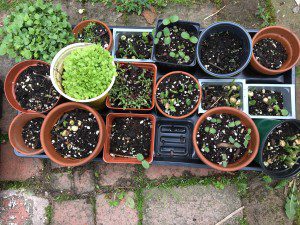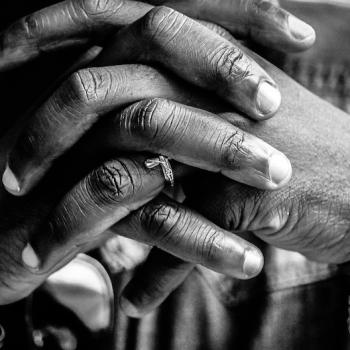As many of you know, I’ve been irritated by Glennon Doyle’s mischaracterization of the concept of self-sacrifice ever since I read Untamed, however many years ago. The manner in which she twisted the idea of dying to the self for the sake of another as though it were a bad thing vexed me so that every now and then, I think about it again and become annoyed. This weekend I gained a small measure of understanding about why, indeed, and how wicked it is to say that loving the self is better than dying–metaphorically–to the self.
The gospel reading for yesterday began like this:
Now among those who went up to worship at the feast were some Greeks. So these came to Philip, who was from Bethsaida in Galilee, and asked him, “Sir, we wish to see Jesus.” Philip went and told Andrew; Andrew and Philip went and told Jesus. And Jesus answered them, “The hour has come for the Son of Man to be glorified. Truly, truly, I say to you, unless a grain of wheat falls into the earth and dies, it remains alone; but if it dies, it bears much fruit. Whoever loves his life loses it, and whoever hates his life in this world will keep it for eternal life. If anyone serves me, he must follow me; and where I am, there will my servant be also. If anyone serves me, the Father will honor him.
There are so many interesting points to draw out of this short vignette. In the first place, Jesus is in the week of his Passion and Death. He knows it’s coming, indeed is precipitating conflict with the people who will eventually deliver him to Pilate. He is watching for signs that his hour is upon him. And yet, I’m always so surprised that the moment he understands that the time is ripe would be something seemingly so unremarkable. Some Greeks have come to the feast, and they “wish to see Jesus.” That’s what he’s been waiting for. That is the sign he is about to be “glorified.” That is when he says these strange words about the grain of wheat.
If you have ever spent any time in Catechesis of the Good Shepherd, you will know that the grain of wheat that falls into the ground and dies is one of the treasured parables presented to young children. Of all the parables Jesus told to draw his friends close and confound his enemies, Cavaletti chose the Pearl of Great Price, the Treasure Hidden in the Field, the Leaven, the Mustard Seed, and the Grain of Wheat to go alongside the most essential image, that of the Shepherd and the Sheep. So, usually sometime between Christmas and Easter, the scripture is opened and the words, “unless a grain of wheat falls into the earth and dies, it remains alone; but if it dies, it bears much fruit,” are read aloud and the children–and the adult–wonder about them.
It’s that word “alone” that confounds the world, I think. We hear constantly and unceasingly about loneliness. It is an epidemic. It is a health crisis. It must be solved. Therefore, articles are written and money is traded from one agency to another. Meanwhile, day to day, moment to moment, the sense of alienation most Western people feel can be measured by the number of hours they scroll on their phones, by the blank misery on their faces as they drive down the road or wander around Walmart. Almost everyone lacks a deeply satisfying relational connection to another, one that is powerful enough to overcome loneliness and ultimately, despair. There are a thousand ways to diagnose and describe the aloneness of being a modern person. There are a million TikToks displaying its depth and breadth. Everyone knows it is there. Everyone feels it. And every day it gets worse. Why is this?
The reason is simple enough, but too hard and strange to accept. The reason the loneliness gets worse every day is that the world, and all the influencers therein, believe and teach the lie that the only way to be connected to other people is not to die. ‘Don’t want to be alone?’ they cry, ‘then do everything that will guarantee your aloneness.’ Privilege yourself. Think about yourself. Be good to yourself. Forgive yourself. Care for yourself. Help yourself. And, to crown them all, Love yourself.
But, unless the grain of wheat falls into the ground and dies, it remains alone. The mystery at the heart of our broken world, the very mystery of Christ who came to save us, is that if you don’t die, you cannot live. Which is to say, if you don’t die, you will always and forever be alone.
What is it that death accomplishes? And what kind of death is it?
This is a great mystery that can only be understood through the pain of experience. The death isn’t physical, or literal. But it is spiritual and real. Jesus really did physically die and so will you. But the metaphorical deaths before that belong in the spiritual, psychic, and even emotional sphere. You die by letting someone else go before you. You die by letting someone else be right, by letting them have what you should have had, by giving them something you believed belonged to you. You let fall into the ground what is yours, what is owed, what is essential to who you are. In the words of Jesus, you go “last” rather than first, and in so doing, you discover that you are poor in spirit, spiritually starving, empty, in the depths of the pit, and that you have no power in yourself to help yourself. You look at your body and mind and soul and are not able to find any strength that will carry you into the life you long to live.
In this way, you “die.” You might still be walking around, struggling through the self-check-out, trying to find a new dentist, despairing over the mountain of laundry, anxious about the days to come, but you will have admitted to God and to yourself that the ground of your own being is death and not life, and that you are alone.
That should be the moment you breathe your actual last. But this is a mystery. It is about the glory of God. It is a recapitulation, in miniature, of how God overturned the sting of death and raised not only you, but all of creation, to life. For when you have given yourself into the hands of Jesus all the love you always needed will be yours, and in abundance. But practically speaking, having died to your own plans and expectations, you can take people as they are. With your alienation stanched and healing, you can forgive other people or open yourself up to them without the gnawing fear of rejection. You can die all the small deaths because of the death of Christ. To put it very simply, you don’t ever have to be alone again.
Have a nice day! And find me on substack.

















